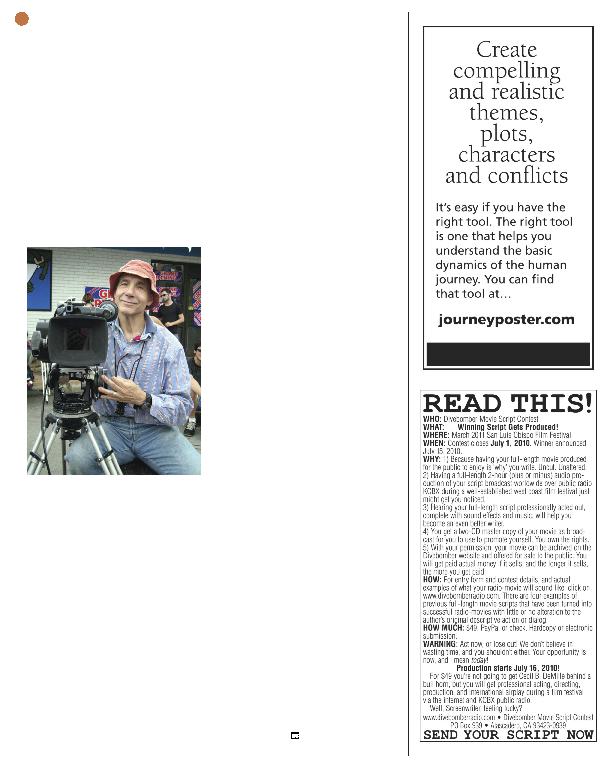
Mayan 2012 calendar myth proliferated both
big and small screen features in the last year. As
have movies with "apocalypse" in the title,
based partly on the success of the Left Behind se-
ries and other such novels and films. Even Dan
Brown-esque "coded" prophecies have made it
to store shelves with The Da Vinci Treasure.
and Troma's Poultrygeist: Night of the Chicken
Dead. However, don't bother Troma Enter-
tainment with another zombie movie. They've
done that already -- multiple times. Instead,
Kaufman suggests writing something you're
passionate about. It doesn't even have to be
in the tradition of Neil LaBute and David
Mamet. Kaufman confesses that he'd love for
someone to write a Who's Afraid of Virginia
Wolf-type film for him or even a children's
movie. The point is to write what you believe
in and never compromise. And write a script
because you want to produce art. If you're writ-
ing just to become rich, stop what you're
doing and become a stockbroker or CEO.
Why? Because along with (often)-formulaic
writing and low-budgets, these low-grade di-
rect-to-DVD genre films offer low pay and few
accolades. The Asylum is not a Writers Guild
signatory and does not pay to scale. So what is
the value of writing for this niche market? One
word: experience.
first time out of the gate. By writing a script for
a small market, a screenwriter can not only de-
able experience. By mastering the formula, you
learn what conventions to break to bring a
fresh perspective to the material. Looking back
at literature as an example, take Stephenie
Meyers' Twilight saga, which takes the story of
"Romeo and Juliet" and places it in the world
of vampires and werewolves.
Blomkamp put a fresh twist on the alien inva-
sion story by having District 9 be about man's
propensity to segregate from people we per-
ceive as being different. In the case, District 9
represented South Africa's apartheid past.
that was on display during this year's Oscar
telecast, when the Academy of Motion Pic-
tures Arts and Sciences honored Roger Cor-
man for his influence on a generation of
filmmakers, who are referred to affection-
ately as coming out of the Roger Corman
School of Film. Notable alumni include such
writers and directors as James Cameron,
Francis Ford Coppola, Martin Scorsese, Ron
Howard, Joe Dante, Jonathan Demme, Pene-
lope Spheeris, Peter Bogdanovich,
and Scooby Doo 2: Monsters Unleashed started
by writing Tromeo & Juliet for Kaufman.
screenplay format." Despite the availability
of dozens of books and magazines on the
subject -- and software programs such as
Final Draft and Movie Magic Screenwriter
that do the formatting for you -- Latt says
improperly formatted scripts cross his desk
every day. Without command of proper
screenplay format, you start with one major
strike against you. Latt says, "I don't have
time to teach someone screenwriting." If you
hope to be a screenwriter, know your craft.
Know what a screenplay looks like. Because if
you do not know how to properly format
text, it does not matter who you know in the
business. Latt once refused to read a script
from a writer his own sister suggested simply
because the format was incorrect.
and Fitzgerald." He also suggests that writers
get out into the world. "Travel. Have experi-
ences. Have something you can write about
and then write it." It may just be your for-
mula for success.